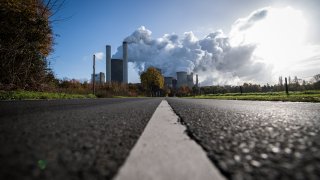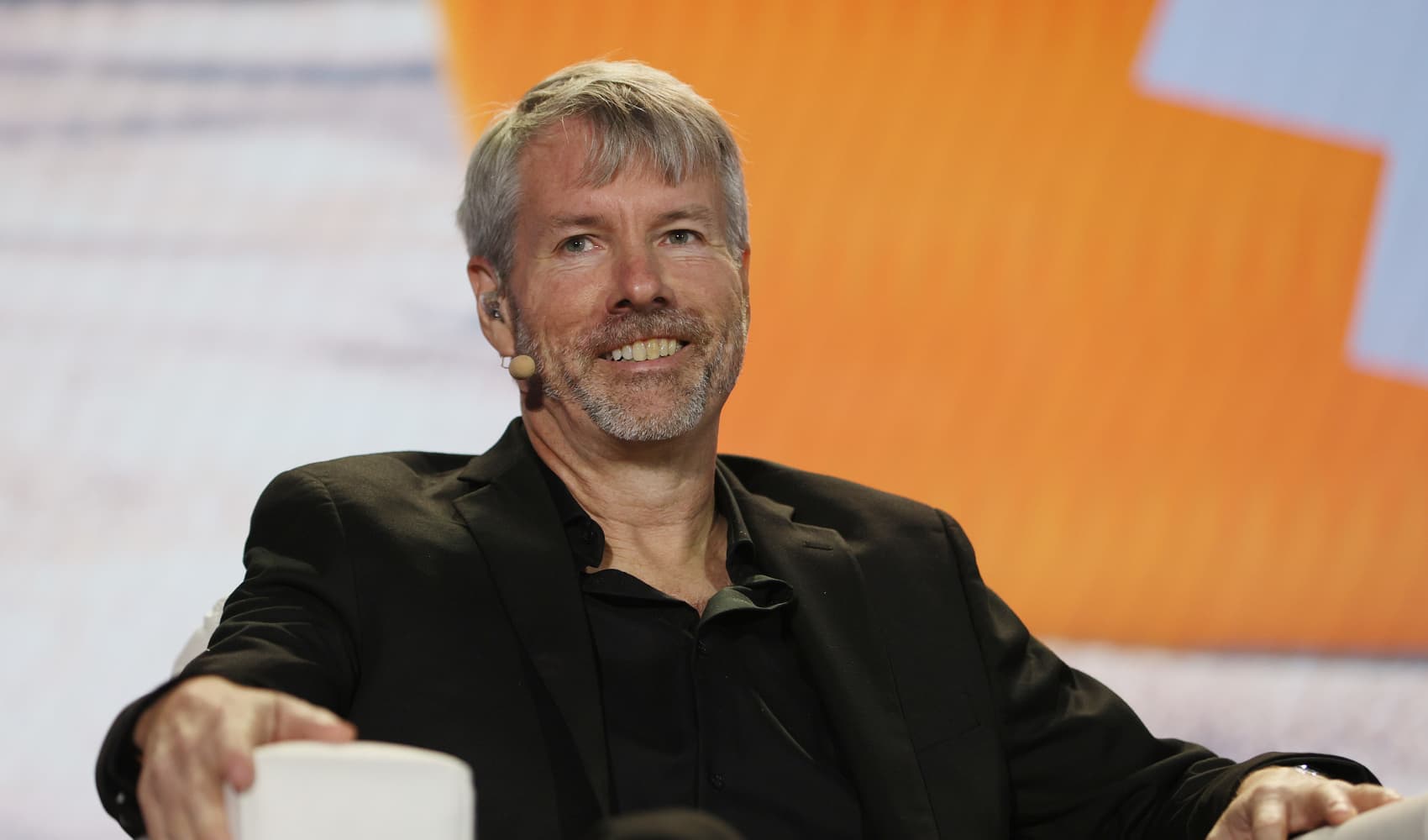
- The U.N. has said global fossil fuel use is "dangerously out of sync" with climate goals.
- Currently, the world gets around 80% of its primary energy supply from fossil fuels and 3% from renewable sources, per Morgan Stanley analysis.
- "A just transition for countries dependent on fossil fuels begins with the recognition that we have to get off of fossil fuels and then you commit the resources to help their economy, to help their workers transition to sustainable alternatives," Carroll Muffett, chief executive at the non-profit Center for International Environmental Law, told CNBC.
LONDON — The deepening climate emergency underscores the urgent need for policymakers to oversee a rapid transition away from fossil fuels.
How countries navigate this switch, however, is fiercely contested.
The burning of energy sources such as coal, oil and gas, is the chief driver of the climate crisis. Yet, while politicians and business leaders routinely tout their commitment to the energy transition, the world's fossil fuel dependency remains on track to get even worse.
Climate scientists have repeatedly stressed the best weapon to tackle rising global temperatures is to reduce greenhouse gas emissions as quickly as possible.
The Glasgow Climate Pact, an agreement reached at the COP26 summit earlier this month, marked the first time ever that an international climate deal explicitly mentioned fossil fuels. The final agreement called for countries to "phase down" coal use and "inefficient" fossil fuel subsidies.
This language has done little to inspire confidence, however, particularly in the wake of research that suggests the vast majority of fossil fuels must be kept in the ground if the world is to have any hope of preventing progressively worse and potentially irreversible climate impacts.
Money Report
The U.N. has said global fossil fuel use is "dangerously out of sync" with climate goals and activists have pushed for governments to dismantle the fossil fuel economy.
Here, experts assess the challenges of decarbonizing the global economy, how quickly it can be achieved and some of the possible interim solutions.
'We have to get off fossil fuels'
"I come from Kentucky, I worked tobacco growing up," Carroll Muffett, chief executive at the non-profit Center for International Environmental Law, told CNBC. "I know what the feel of the tar in my nose is, I know what the choking feeling of the tar in your lungs is when you're stripping tobacco in winter. And the truth is the U.S. began regulating cigarettes more aggressively because it needed to be done."
"Yes, there are many people employed in these spaces but that was true of asbestos before. These are products that need to be moved out of our economy."
Muffett said a "fundamental prerequisite" to a just transition would be for policymakers to explicitly acknowledge that a transition needs to happen. He cited the U.S. government and the coal industry pledging "over and over again" to find ways to use coal despite the climate and health impacts.
"We have to get off fossil fuels, we know that. So, a just transition for countries dependent on fossil fuels begins with the recognition that we have to get off of fossil fuels and then you commit the resources to help their economy, to help their workers transition to sustainable alternatives," Muffett said.
"We see solar and wind being the cheapest source of new energy for more than two-thirds of the world's population now and rapidly accelerating. They are increasingly cheaper than new-build coal and gas plants, but they are also cheaper than fossil fuels in existing infrastructure. And I think one of the really important things about those renewable energies, particularly solar, is that they are scalable. They can be deployed at very small scales, including in remote areas, where you don't have to wait for the grid to arrive."
What transition?
Earlier this year, the influential International Energy Agency published the world's first comprehensive roadmap to building a global energy sector with net-zero emissions by 2050.
The world's leading energy organization said in May that there could be no new oil, gas or coal development if the world is to reach net zero by the middle of the century. It added government pledges at that time fell "well short" of what would be necessary to reach net zero.
To put the total size of the energy market into perspective, global markets for coal and natural gas are both bigger than all metal markets combined — and the oil market is almost double that size, according to an analysis by Morgan Stanley.
Fossil fuels accounted for more than 80% of global energy consumption in 2019, according to data compiled by Our World in Data, while renewables such as wind and solar accounted for 11.4%.
What's more, while the total amount of renewable energy that's available is growing, it is still lower than the increase in global energy demand overall.
"Taking into account that the entire energy system is growing as well, the switch from fossil fuels to renewables is not a quick one," Martijn Rats, chief commodities strategist at Morgan Stanley, told CNBC via email.
"The energy transition will not be realized with start-ups alone," he added. "We need the major energy companies of the world to make the trillions in investments that are needed over the next few decades. Today's fossil fuel companies have a role to play in this. With their engineering and project management expertise, and global reach, they are capable of realizing those large infrastructure projects."
An investment into a livable future
Oil producer group OPEC has said the narrative that the energy transition is from fossil fuels to renewables "is misleading and potentially dangerous to a world that will continue to be thirsty for all energy sources."
In remarks to assembled delegates at COP26 on Nov. 10, OPEC Secretary-General Mohammed Barkindo said a failure to listen to all voices on issues such as reducing emissions, energy affordability and security could lead to unintended consequences. These include market distortions, heightened volatility and energy shortfalls.
To be sure, all of these examples are already evident — and at a time when the global energy mix is still dominated by fossil fuels.
A coalition of major gas exporters, meanwhile, has warned about persistent "reductionism and cancel culture" on hydrocarbons. In a statement to the U.N., the Gas Exporting Countries Forum said it believed gas offered "a complete and balanced" solution to the transition.
"That's what we call the discourse of climate delay," Julia Steinberger, ecological economist at the University of Lausanne, told CNBC. "That's a classic one. We call it fossil fuel solutionism, which is that even though they are the problem, it is still also supposed to be the solution."
In a paper published in the journal Global Sustainability last July, economist William Lamb and several other co-authors, including Steinberger, sought to identify the most common messaging from proponents for minimal climate action. These "discourses of climate delay" fall into four main groups: "Redirect responsibility" (someone else should take action first), "push non-transformative solutions" (disruptive change is unnecessary), "emphasize the downsides" (change will be difficult), or "surrender" (it is not possible to mitigate climate change).
Fossil fuel solutionism, Lamb's team says, is categorized as "push for non-transformative action." It refers to the messaging that promotes ineffective solutions and draws attention away from more effective measures.
"One of the main arguments here that's being made is like: 'Oh, well if you transition overnight then you are going to be in trouble,'" Steinberger said. "We'd love to transition overnight and obviously we can't, but we have to transition as fast as humanly possible and we're not trying that. And one of the reasons we're not trying that is exactly because these industries position themselves as: 'You're still going to need us moving forward.'"
"We basically have to make it explicit, which is again something that hasn't happened at COP, that every government is trying to avoid fossil fuels. That looks like electrification, it looks like generating renewable energy. All of these things, which are highly technically feasible and cost-effective, it is just that the ramp-up of them is going to be financially painful because it has been waiting so long."
Steinberger said the decarbonization transition would require "massive" public funds that would likely incur public debt, but this should not be seen as a problem because it is an investment "into a livable future where we don't destroy the planet and the economy and everybody's means of life."
"It is entirely doable, and it is doable fast, but it will come with a price tag which will then be repaid forever after in a prosperous and healthy society. So, that's what it is going to take."
'Green power gap'
"Governments will need to judge the tolerance to fund the transition, which in the long term will lead to cheaper energy. No doubt over the transition period, [prices] are going to go up," Steve Varley, global vice chair for sustainability at management consultancy EY, told CNBC by phone.
"All governments will be incredibly focused on [avoiding] power cuts and the prices being charged for electricity accelerating — it's a tough call," he said of the transition.
EY research suggests there is a "green power gap," with an additional $5.2 trillion needed to meet IEA's scenarios for renewable energy development, and there is also a divide between developed and developing nations.
"Specific industry sectors also face a 'burning platform' of limited capital and shifting consumer preferences, leaving infrastructure and jobs stranded," he said.
"If developing countries cannot license, import and scale green technology at a viable price, the incentive to extract and use fossil fuels will remain," Varley said in an October post on EY's website. Oil and gas-producing countries such as Angola, Iraq and Libya are likely to suffer, per the International Renewable Energy Agency.
Alan Thomson, global energy leader at engineering firm Arup, said hydrogen could be part of "low-carbon clusters" in the shift away from fossil fuels.
These are "smaller units of green energy that can be connected to other solutions in time – that spread, multiply and then dominate, increasingly delivering value as they become more and more interconnected," he told CNBC by email.
That might mean using green hydrogen to fuel a fleet of buses, Thomson said. Clusters can be scaled up, too. "For example, if several neighboring areas of a city were to develop clusters converting domestic gas supplies to hydrogen, they could then be joined together," Thomson added.
"The greater scale of demand could then make it worth developing the next piece of the jigsaw – for instance, replacing tanker shipments of hydrogen with a pipeline to a larger production facility nearby."
Will we see energy shortages as the transition happens? For Thomson, energy storage is going to be the issue.
"The big challenge is ensuring our energy system storage is not diminished in the transition. The storage of molecular fuels – for example petrol, natural gas – is relatively straightforward, we have the infrastructure in place, and it has high energy density," he said.
Hydrogen could provide part of the answer, he added. "Electrification comes with storage challenges – particularly ensuring there is a buffer to ensure that supply and demand are balance. That's why we think hydrogen, along with electricity is crucial to energy resilience – to make sure there is an easily storable form of energy available, that works with the infrastructure we already have," he added.
— CNBC's Anmar Frangoul contributed to this report.






